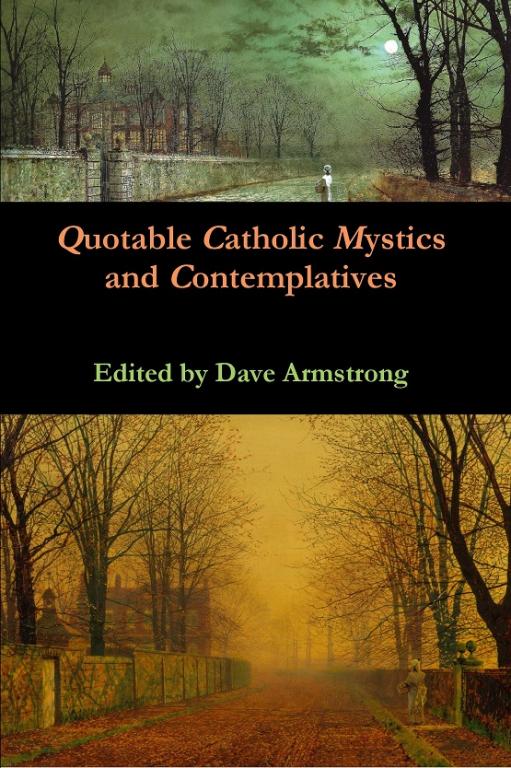
[From my book, Quotable Catholic Mystics and Contemplatives (April 2014, 304p), pp. 224-230. Follow the link for book and purchase information]
The Servitor’s own father, who had led a very worldly life, appeared to him after death, and with a woeful aspect showed him his agonising purgatory, and the chief sins for which he had incurred it, and explained to him distinctly how he was to help him. The Servitor did this; and afterwards his father appeared to him, and told him that he had been set free. (Bl. Henry Suso, The Life of Blessed Henry Suso by Himself, ch. 8)
Now, therefore, you have understood how suffering satisfies for guilt by perfect contrition, not through the finite pain; and such as have this contrition in perfection satisfy not only for the guilt, but also for the penalty which follows the guilt, as I have already said when speaking in general; and if they satisfy for the guilt alone, that is, if, having abandoned mortal sin, they receive grace, and have not sufficient contrition and love to satisfy for the penalty also, they go to the pains of Purgatory, passing through the second and last means of satisfaction. (St. Catherine of Siena, The Dialogue, “A Treatise of Divine Providence”)
It is better to atone for sin now and to cut away vices than to keep them for purgation in the hereafter. In truth, we deceive ourselves by our ill-advised love of the flesh. What will that fire feed upon but our sins? (Thomas à Kempis, The Imitation of Christ, Bk. I, ch. 24)
If you say that you cannot suffer much, how will you endure the fire of purgatory? (Thomas à Kempis, The Imitation of Christ, Bk. III, ch. 12)
If we regarded our own proper good, it would seem better to us to suffer here for a little than to remain in torments forever; better to suffer for a thousand years every woe possible to this body in this world, than to remain one hour in purgatory. (St. Catherine of Genoa, Spiritual Dialogue, Pt. I, ch. 16)
We are all sinners, and how much better is it to be cleansed here than in the other life! For whoever suffers purgation in this life pays but a small portion of what is due, by reason of the liberty of his free-will cooperating with infused grace. (St. Catherine of Genoa, Spiritual Dialogue, Pt. II, ch. 2)
There is no peace to be compared with that of the souls in purgatory, save that of the saints in paradise, and this peace is ever augmented by the inflowing of God into these souls, which increases in proportion as the impediments to it are removed. The rust of sin is the impediment, and this the fire continually consumes, . . . In purgatory the flames incessantly consume it, and as it disappears, the soul reflects more and more perfectly the true sun who is God. Its contentment increases as this rust wears away, . . . On the other hand, it is true that they suffer torments which no tongue can describe nor any intelligence comprehend, . . . (St. Catherine of Genoa, Treatise on Purgatory, ch. 2)
Since the souls in purgatory are freed from the guilt of sin, there is no barrier between them and God save only the pains they suffer, which delay the satisfaction of their desire. (St. Catherine of Genoa, Treatise on Purgatory, ch. 3)
The souls in purgatory are entirely conformed to the will of God; therefore, they correspond with his goodness, are contented with all that he ordains, and are entirely purified from the guilt of their sins. They are pure from sins, because they have in this life abhorred them and confessed them with true contrition, and for this reason God remits their guilt, so that only the stains of sin remain, and these must be devoured by the fire. Thus freed from guilt and united to the will of God, they see him clearly according to that degree of light which he allows them, and comprehend how great a good is the fruition of God, for which all souls were created. (St. Catherine of Genoa, Treatise on Purgatory, ch. 5)
[T]he soul, leaving the body, and not finding in herself that purity in which she was created, and seeing also the hindrances which prevent her union with God, conscious also that purgatory only can remove them, casts herself quickly and willingly therein. (St. Catherine of Genoa, Treatise on Purgatory, ch. 7)
[T]he divine essence is so pure—purer than the imagination can conceive—that the soul, finding in itself the slightest imperfection, would rather cast itself into a thousand hells than appear, so stained, in the presence of the divine majesty. Knowing, then, that purgatory was intended for her cleaning, she throws herself therein, and finds there that great mercy, the removal of her stains. The great importance of purgatory, neither mind can conceive nor tongue describe. . . . a soul, stained with the slightest fault, receiving this mercy, counts its pains as naught in comparison with this hindrance to her love. And I know that the greatest misery of the souls in purgatory is to behold in themselves aught that displeases God, and to discover that, in spite of his goodness, they had consented to it. And this is because, being in the state of grace, they see the reality and the importance of the impediments which hinder their approach to God. (St. Catherine of Genoa, Treatise on Purgatory, ch. 8)
When the soul beholds within herself the amorous flame by which she is drawn toward her sweet Master and her God, the burning heat of love overpowers her and she melts. Then, in that divine light she sees how God, by his great care and constant providence, never ceases to attract her to her last perfection, and that he does so through pure love alone. She sees, too, that she herself, clogged by sin, cannot follow that attraction toward God, that is, that reconciling glance which he casts upon her that he may draw her to himself. Moreover, a comprehension of that great misery, which it is to be hindered from gazing upon the light of God, is added to the instinctive desire of the soul to be wholly free to yield herself to that unifying flame. I repeat, it is the view of all these things which causes the pain of the suffering souls in purgatory, not that they esteem their pains as great (cruel thought they be), but they count as far worse that opposition which they find in themselves to the will of that God whom they behold burning for them with so ardent and so pure a love. This love, with its unifying regard, is ever drawing these souls, as if it had no other thing to do; and when the soul beholds this, if she could find a yet more painful purgatory in which she could be more quickly cleansed, she would plunge at once therein, impelled by the burning, mutual love between herself and God. (St. Catherine of Genoa, Treatise on Purgatory, ch. 9)
From that furnace of divine love I see rays of fire dart like burning lamps towards the soul; and so violent and powerful are they that both soul and body would be utterly destroyed, if that were possible. These rays perform a double office; they purify and they annihilate. Consider gold: the oftener it is melted, the more pure does it become; continue to melt it and every imperfection is destroyed. This is the effect of fire on all materials. The soul, however, cannot be annihilated in God, but in herself she can, and the longer her purification lasts, the more perfectly does she die to herself, until at length she remains purified in God. When gold has been completely freed from dross, no fire, however great, has any further action on it, for nothing but its imperfections can be consumed. So it is with the divine fire in the soul. God retains her in these flames until every stain is burned away, and she is brought to the highest perfection of which she is capable, each soul in her own degree. (St. Catherine of Genoa, Treatise on Purgatory, ch. 10)
*
It is true that the divine love which overwhelms the soul gives, as I think, a peace greater than can be expressed; yet this peace does not in the least diminish her pains, nay, it is love delayed which occasions them, and they are greater in proportion to the perfection of the love of which God has made her capable. “Thus have these souls in purgatory great pleasure and great pain; nor does the one impede the other. (St. Catherine of Genoa, Treatise on Purgatory, ch. 12)
If by repentance the souls in purgatory could purify themselves, a moment would suffice to cancel their whole debt, so overwhelming would be the force of the contrition produced by the clear vision they have of the magnitude of every obstacle which hinders them from God, their love and their final end. “And, know for certain that not one farthing of their debt is remitted to these souls. This is the decree of divine justice; it is thus that God wills. But, on the other hand, these souls have no longer any will apart from that of God, and can neither see nor desire aught but by his appointment. (St. Catherine of Genoa, Treatise on Purgatory, ch. 13)
I see that the souls in purgatory behold a double operation. The first is that of the mercy of God; for while they suffer their torments willingly, they perceive that God has been very good to them, considering what they have deserved and how great are their offences in his eyes. For if his goodness did not temper justice with mercy (satisfying it with the precious blood of Jesus Christ), one sin alone would deserve a thousand hells. They suffer their pains so willingly that they would not lighten them in the least, knowing how justly they have been deserved. They resist the will of God no more than if they had already entered upon eternal life. The other operation is that satisfaction they experience in beholding how loving and merciful have been the divine decrees in all that regards them. In one instant God impresses these two things upon their minds, and as they are in grace they comprehend them as they are, yet each according to her capacity. They experience thence a great and never-failing satisfaction which constantly increases as they approach to God. They see all things, not in themselves nor by themselves, but as they are in God, on whom they are more intent than on their sufferings. For the least vision they can have of God overbalances all woes and all joys that can be conceived. Yet their joy in God does by no means abate their pain. (St. Catherine of Genoa, Treatise on Purgatory, ch. 16)
The person I speak of learnt from this how much more acutely the spirit is capable of suffering than the body; she understood that this resembled the pains of purgatory, where the absence of the flesh does not prevent the torture’s being far worse than any we can feel in this world. (St. Teresa of Ávila, The Interior Castle, Pt. VI, ch. 11)
This is the reason why those who lie in purgatory suffer great misgivings as to whether they will ever go forth from it and whether their pains will ever be over. For, although they have the habit of the three theological virtues—faith, hope and charity—the present realization which they have of their afflictions and of their deprivation of God allows them not to enjoy the present blessing and consolation of these virtues. For, although they are able to realize that they have a great love for God, this is no consolation to them, since they cannot think that God loves them or that they are worthy that He should do so; rather, as they see that they are deprived of Him, and left in their own miseries, they think that there is that in themselves which provides a very good reason why they should with perfect justice be abhorred and cast out by God for ever. And thus although the soul in this purgation is conscious that it has a great love for God and would give a thousand lives for Him (which is the truth, for in these trials such souls love their God very earnestly), yet this is no relief to it, but rather brings it greater affliction. (St. John of the Cross, Dark Night of the Soul, Bk. II, ch. 7)
[T]he soul, as it becomes purged and purified by means of this fire of love, becomes ever more enkindled in love, just as the wood grows hotter in proportion as it becomes the better prepared by the fire. This enkindling of love, however, is not always felt by the soul, but only at times when contemplation assails it less vehemently, for then it has occasion to see, and even to enjoy, the work which is being wrought in it, and which is then revealed to it. For it seems that the worker takes his hand from the work, and draws the iron out of the furnace, in order that something of the work which is being done may be seen; and then there is occasion for the soul to observe in itself the good which it saw not while the work was going on. In the same way, when the flame ceases to attack the wood, it is possible to see how much of it has been enkindled. . . . we shall likewise learn here the reason why it seems to the soul that all its good is over, and that it is full of evil, since naught comes to it at this time but bitterness; it is like the burning wood, which is touched by no air nor by aught else than by consuming fire. But, when there occur other periods of relief like the first, the rejoicing of the soul will be more interior because the purification has been more interior also. (St. John of the Cross, Dark Night of the Soul, Bk. II, ch. 10)
[clarifying note added on 6-27-20: the view of St. John of the Cross, to the effect that souls in purgatory are not sure that they will ever get out, is a minority view in Catholic tradition. The majority opinion is that souls in purgatory are consciously sure of salvation. In the Catholic Encyclopedia‘s article on Purgatory under the heading “Nature of Punishment” arguments are presented in favor of souls in purgatory having conscious assurance of salvation. That the souls in purgatory are certain of salvation in an objective sense, is required by the papal bull Exsurge Domine (1520): as the Catholic Encyclopedia points out.
***













